Mastering the Art of Cleaning Your Stove Grill
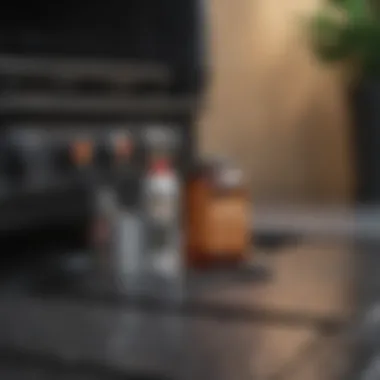

Intro
Maintaining a clean stove grill is essential for both aesthetics and functionality. A well-kept grill not only enhances the overall appearance of your kitchen but also ensures optimal cooking performance. Grime and food residue can build up over time, affecting the flavor of your meals and posing potential health risks.
In this guide, we will explore a variety of effective methods and materials for cleaning stove grills. You will also learn about the best practices for maintenance to prolong the life of your grill. Understanding the cleaning process will empower you to tackle even the most stubborn messes with confidence.
Let’s begin by breaking down the cleaning methods based on the type of grill you own. This knowledge will provide a solid foundation for mastering the art of stove grill maintenance.
Prelims to Stove Grills
Stove grills are an essential part of many kitchens, acting as versatile cooking apparatus used for a variety of meals, from searing meats to grilling vegetables. Understanding their structure and functionality is vital for anyone looking to maintain a clean and efficient cooking environment.
These grills can come in several types including gas, electric, and induction, each with its own set of cleaning and maintenance needs. By familiarizing yourself with these differences, you can take more informed steps towards keeping your specific grill in top condition. The longevity and performance of your stove grill often depend on regular cleaning, which prevents the buildup of residue and other harmful substances.
It's also essential to recognize the balance between usability and cleanliness. Effective upkeep not only preserves the operational integrity of the grill but also ensures that each meal is flavorful—a factor often overlooked by many. Thus, right from the outset, the importance of knowing how to clean your stove grill cannot be understated.
Additionally, it is worth considering the aesthetic appeal of a clean grill. A tidy kitchen reflects an organized mind and promotes a positive cooking atmosphere. When hosting gatherings or dinner parties, a well-maintained grill can ignite conversations and inspire culinary creativity among guests. By maintaining awareness about your stove grill, you embrace a more gratifying cooking experience.
In this section, the groundwork is laid for understanding stove grills comprehensively. You will gain insights into not just cleaning practices but also how various grills impact the culinary outcomes you desire.
Importance of Keeping Your Stove Grill Clean
Cleaning your stove grill is not just a matter of aesthetics; it directly affects your health, the taste of your food, and the overall lifespan of your appliance. Understanding these facets can help create a more enjoyable cooking experience and ensure that the grill operates efficiently. This section will explore the critical aspects of keeping your stove grill in a clean state.
Health Implications
A dirty stove grill can serve as a breeding ground for harmful bacteria and pathogens. When food residue accumulates, it can attract pests and provide an environment where germs can thrive. For those who cook frequently, this can pose a risk to food safety, leading to potential contamination. Regular cleaning not only minimizes these risks but also ensures that you are cooking on a surface that is free from harmful substances.
Moreover, smoke and grease buildup can release toxins when heated, affecting the air quality in your kitchen. This is something to factor in especially for those with respiratory issues. Most importantly, maintaining a clean grill reduces the likelihood of flare-ups that can lead to dangerous situations.
Impact on Flavor
The flavor of your food can drastically change based on the cleanliness of your grill. Residue from previous meals can impart an unwanted taste to new dishes. This is especially true if you are grilling meats or vegetables absorb flavors from greasy buildup. For individuals who take pride in their culinary skills, having a clean grill is essential to achieving the desired flavor profile.
Ingredients like herbs, spices, and marinades should shine, not be overshadowed by old grease. The act of cleaning your grill allows you to start fresh, ensuring that each meal has the authentic taste you intend to deliver.
Longevity of the Grill
Finally, the longevity of your stove grill hinges significantly on how well you maintain it. The build-up of grease can lead to corrosion and rust, weakens parts, and necessitates repairs or replacements. In contrast, a well-maintained grill operates more efficiently and can last for several years longer than one that is neglected. Regular cleaning helps protect your investment and minimizes long-term costs associated with repairs or purchasing new equipment.
Necessary Tools and Materials for Cleaning
To effectively clean your stove grill, having the correct tools and materials is non-negotiable. The right supplies can enhance your cleaning efficiency and yield better results. They enable a thorough clean without damaging your grill surfaces. Moreover, being equipped with appropriate materials can save both time and effort in the long run. Understanding the necessary tools can also prevent damaging your grill, ensuring its longevity and functionality.
Basic Cleaning Supplies
Sponges and Scrubbers
Sponges and scrubbers are essential for tackling grime on the surfaces of your stove grill. Their porous structure allows them to absorb grime while the scrubbing side helps remove stubborn residues. The versatility of these tools makes them a popular choice for many. When selecting sponges, consider those with non-scratch surfaces to avoid damaging your grill. They are also reusable, which provides cost-effectiveness in your cleaning routine. However, pay attention to hygiene; ensure to wash them regularly as bacteria can accumulate over time.
Cleaning Cloths
Cleaning cloths are another critical tool you cannot overlook. They are perfect for wiping down surfaces after scrubbing. Generally made of microfiber or cotton, these cloths trap dust and dirt effectively. Their softness prevents scratches, making them ideal for shiny surfaces. A key feature is their reusability and washability, which aligns with an eco-friendly mindset. However, be mindful to use separate cloths for different areas to avoid cross-contamination.
Bucket for Soaking
A bucket for soaking components, like grates and burners, facilitates a more thorough clean. Soaking helps to dissolve stubborn grease and food particles, which makes scrubbing easier. Choose a sturdy bucket that can hold hot water and cleaning solution. The benefit is that it reduces physical effort when scrubbing dirty components. One consideration is space since a larger bucket can take up more room in your cleaning area.
Specialized Cleaners
Degreasers

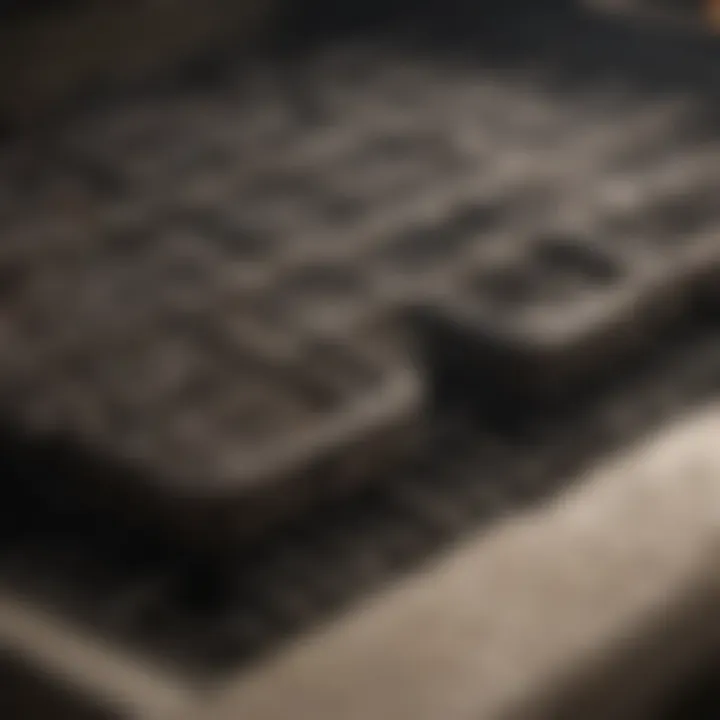
Degreasers are powerful cleaning agents designed to break down grease and oil deposits effectively. They are a go-to choice for tackling difficult stains that regular soap may not remove. Their concentrated formula works quickly, allowing for less scrubbing time. Using a degreaser can dramatically cut cleaning time, making it a beneficial addition for busy homeowners. However, it is essential to handle them with care to avoid skin and surface damage.
Nontoxic Solutions
Nontoxic cleaning solutions present a safer alternative for those concerned about chemicals. These solutions utilize natural ingredients like vinegar or baking soda, which can effectively clean without leaving harmful residues. The major advantage is their safety for both users and the environment. They also often come at a lower cost compared to commercial cleaners, making them a budget-friendly choice. However, they may require more time or effort to achieve the same level of cleanliness as commercial products.
Chemical Cleaners
Chemical cleaners are designed for heavy-duty cleaning. They often contain specialized ingredients that can tackle the toughest grime with ease. Their efficacy in breaking down tough residues makes them appealing, especially for thorough cleanings. Nevertheless, it is crucial to use them according to instructions to avoid risks associated with harsh chemicals, like skin irritation or inhalation issues. Additionally, they may not be suitable for all grill surfaces, so discerning their compatibility is vital.
Safety Equipment
Gloves
Gloves are a simple yet essential safety tool when cleaning your stove grill. They protect your hands from harsh chemicals and hot surfaces. Choosing gloves that are durable and resistant to chemicals ensures they last longer and provide adequate protection. One unique feature is that they come in various sizes, enabling a snug fit that can enhance control during cleaning. However, ensure to frequently check for any signs of wear, as damaged gloves may not provide the intended protection.
Protective Eyewear
Protective eyewear is crucial to shield your eyes from splashes and debris during the cleaning process. These are available in many styles, including goggles and safety glasses, providing flexibility in choice. A key feature is their ability to offer unobstructed vision while ensuring full coverage. Using protective eyewear is simple, yet it adds a crucial layer of safety. On the downside, they may fog up, hindering visibility, so choose anti-fog options when possible.
Ventilation Considerations
Ventilation is a critical aspect when using certain cleaning agents, particularly chemical cleaners. Proper airflow can help disperse fumes that might be harmful when inhaled. Ensuring a well-ventilated area prevents the buildup of potentially toxic gases. It’s also beneficial when using strong nontoxic solutions, as ventilating minimizes any lingering odors. However, be cautious of weather conditions that may prevent proper ventilation, as you would not want to compromise your safety.
Step-by-Step Guide to Cleaning Your Stove Grill
Cleaning your stove grill is a critical process for maintaining its functionality and hygiene. This section aims to provide a clear, methodical approach to ensure that every nook and cranny of your grill is attended to. The benefits include improved performance, better taste of food, and a longer lifespan for your appliance. A thorough cleaning regime also helps in recognizing parts that may need repairs. The step-by-step guidance offered here serves as a blueprint for achieving a spotless and efficient stove grill.
Preparation Stage
Gathering Tools
Gathering the right tools is essential before starting the cleaning process. Having the necessary items on hand can make the task smoother and more efficient. Key characteristics of these tools include their ability to reach various surfaces without damaging them. Sponges, scrub brushes, and cleaning sprays are common choices. They are beneficial because they come in different textures tailored for specific tasks. A unique feature of sponges is their versatility; different sides can be used for tough spots or gentle wiping. Properly chosen tools can save time, but improper ones might scratch surfaces or leave residue.
Disconnecting Power/Gas Supply
Before you begin cleaning, disconnecting the power or gas supply is critical for safety. This process ensures that there are no risks of accidental ignition or electrical shock. A key characteristic of this step is that it protects you while you clean. It can be seen as a beneficial precaution. By turning off the supply, you minimize risk as cleaning solutions can be harmful if they contact live parts. However, it is important to remember to reconnect the power or gas supply after the cleaning is complete to avoid service disruptions.
Removing Components
Removing components from the stove grill is a necessary step that enables easy access to all areas requiring cleaning. This action allows you to clean under the grates and around the burners, enhancing the overall cleaning process. The advantage of removing components lies in the fact that it facilitates a deeper clean, which is often not achievable otherwise. Additionally, understanding how to properly take off and replace parts can prolong the lifespan of your grill. However, care must be taken as any errors in reassembly can lead to functionality issues.
Initial Cleaning Process
Soaking Grates
Soaking the grates is an effective way to loosen baked-on food particles. This process significantly contributes to the ease of scrubbing afterwards. Moreover, food residues tend to dissolve better when soaked, making them easier to remove. This characteristic of soaking is particularly beneficial for grease-heavy grills. A unique feature of this method is that it saves time and effort in scrubbing. The downside could be that you must plan ahead, as it requires additional soaking time.
Cleaning Burners
Cleaning burners is crucial because they are integral to cooking performance. A buildup of grease can hinder heat distribution and compromise the flavor of foods. The key characteristic of cleaning burners is that it helps maintain efficient cooking temperatures. It is favored in this cleaning guide due to its direct impact on cooking quality. A unique feature of burner cleaning involves removing dirt from the gas ports to ensure an even flame. Neglecting this step can lead to uneven cooking and potential fire hazards.
Wiping Down Panel Surfaces
Wiping down panel surfaces helps maintain an overall clean and presentable appearance of your stove grill. The process emphasizes cleanliness and hygiene, which is essential for safe cooking. The key characteristic of this step is the focus on removing dust and spills that may cause performance issues. It is a popular step included in this guide due to its simplicity and effectiveness. The unique advantage of wiping down surfaces regularly is that it prevents the buildup of grime, which can become harder to remove later.
Cleaning Different Types of Stove Grills
Stove grills come in various types, and each has distinct cleaning requirements. Understanding how to clean gas grills, electric grills, and induction cooktops is crucial not only for hygiene but also for the optimal performance of the appliances. Different materials and designs necessitate specific techniques to prevent damage while ensuring effective cleaning. Moreover, knowing the right methods for each type of grill can enhance its longevity and maintain its aesthetic appeal, ultimately contributing to a better cooking experience.
Gas Grill Cleaning
Cleaning a gas grill requires attention to both the exterior and interior components. The exterior can accumulate grease and grime over time due to cooking splatters. Regular cleaning helps prevent these substances from hardening, which would make cleaning more challenging. Remove and wash the grates and burner covers with a suitable cleaner to prevent flare-ups during cooking.
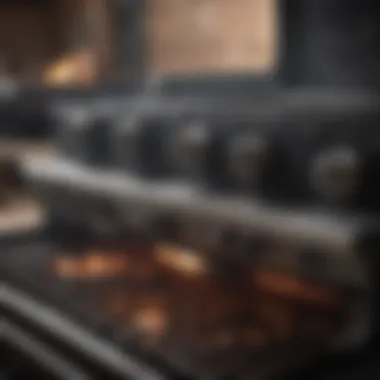
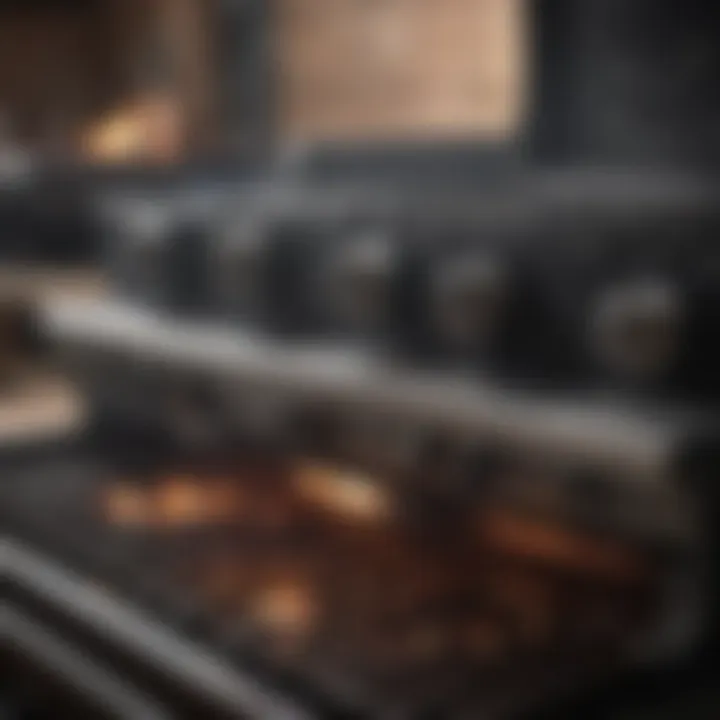
When cleaning the burners, ensure that ports are free from debris. This can prevent uneven cooking or gas buildup, which poses a safety hazard. A soft brush can effectively clear out the ports without damaging them. After cleaning, check all connections to ensure there are no gas leaks.
Electric Grill Cleaning
Electric grills, while easier to clean than their gas counterparts, still require diligence. Make sure to unplug the appliance before starting. Begin by wiping down the surfaces with a damp cloth to remove any residue. The removable plates or grates should be soaked and scrubbed as per the manufacturer’s instructions. Use non-abrasive materials to avoid scratching the surfaces.
Pay special attention to the heating elements to ensure they are free of buildup. Do not immerse the electric grill in water; instead, focus on wiping it down and using a wet cloth or sponge. Ensuring the grill is dry before reassembly is critical to avoid any electrical shorts.
Induction Cooktop Maintenance
Induction cooktops require a different approach. While they do not produce direct flame, they still need regular cleaning to maintain their sleek appearance and functionality. After cooking, allow the surface to cool before cleaning. Use a soft cloth or pad with warm water and mild detergent. Avoid using steel wool or harsh chemicals, as these can scratch the surface.
Additionally, cleaning up spills promptly prevents food from becoming baked onto the surface, which can be challenging to remove later. Ensuring a clean cooktop supports better heat transfer and efficiency.
In summary, understanding how to clean each type of stove grill can extend its life span, enhance safety, and improve culinary results. Regular maintenance is essential to enjoy a clean, efficient cooking environment.
Common Mistakes to Avoid When Cleaning
When it comes to cleaning stove grills, avoiding common mistakes can greatly enhance the effectiveness of your efforts. Understanding these pitfalls is essential for maintaining the quality and longevity of your grill. Many homeowners and cooking enthusiasts may overlook these errors, leading to inefficient cleaning and possible damage to the grill. This section will discuss key mistakes to avoid, focusing on their specific elements, benefits, and considerations.
Using the Wrong Tools
Selecting appropriate cleaning tools is fundamental for efficient stove grill maintenance. Using the wrong tools can result in inadequate cleaning and potential damage. For instance, abrasive scrubbers may scratch the surface of your grill, while certain chemicals can corrode its components. Therefore, always assess the type of grill you use. For stainless steel grills, soft sponges and microfiber cloths are suitable. On the other hand, cast iron grills can benefit from stiff bristle brushes.
Utilizing specialized grill cleaning tools such as silicone spatulas or dedicated grill brushes can provide better results. Opt for non-toxic cleaners to ensure the safety of your food preparation area. Always read labels to confirm compatibility with your grill’s materials. In doing so, you not only care for the grill but also ensure that your cooking surface remains safe and hygienic.
Neglecting Regular Maintenance
Routine maintenance is crucial in prolonging the lifespan of your stove grill. Neglecting regular maintenance can lead to stubborn grime buildup, making deep cleaning more difficult. It is easy to postpone cleaning tasks, but this can result in excessive residue that may even impact flavor.
Establish a cleaning schedule, ideally after every few uses. Cleaning the grill’s surface and grates immediately after cooking can prevent food particles from hardening. Additionally, a quick wipe-down of the entire grill once in a while maintains its aesthetic and functional quality. Regular maintenance not only eases cleaning efforts but also ensures your grill remains in excellent working condition.
Improperly Storing Cleaning Supplies
How you store your cleaning supplies can also impact your cleaning routine. Improperly storing cleaning supplies may lead to damaged materials and ineffective tools. For example, if chemical cleaners are stored close to food items, it raises safety concerns. Similarly, leaving tools exposed to moisture can cause rust or mold build-up.
Store cleaners and tools in a dry, secure location, separate from food items. Clearly label containers to prevent confusion and ensure the right tool is always at hand. Consider using bins or caddies for organization. In this way, you maintain a clean and efficient cleaning process, which reflects on the overall maintenance of your stove grill.
Maintaining Your Stove Grill Between Cleanings
Keeping your stove grill clean is crucial, not just for aesthetics but also for its performance and your health. Regular maintenance between deep cleanings can prevent buildup that makes full cleanings harder and more time-consuming. When a stove grill is regularly maintained, it enhances its longevity, ensures a more pleasant cooking experience, and contributes to better hygiene in your kitchen. Here are some key elements to consider for your ongoing grill maintenance:
Regular Wipe Downs
One of the simplest yet most effective methods to maintain your stove grill is to conduct regular wipe downs after each use. This small act can prevent grease and food particles from hardening and creating stubborn stains that require more intensive cleaning later. Use a damp cloth or sponge with mild soap to clean the surfaces. Ensure you focus on the areas where spills are most likely to occur, such as around the burners and grates. It’s also advisable to wipe down the control knobs and panel to remove oils from your fingers.
- Frequency: Aim to wipe down your grill after every use, or at least several times a week.
- Technique: Use circular motions to efficiently lift debris and avoid pushing grime around.
Covering the Grill
Investing in a high-quality grill cover can significantly aid in maintaining the cleanliness of your stove grill. Covering it when not in use protects it from dust, spills, and other potential contaminants that could affect its condition. Choose a cover that fits snugly to prevent dust and humidity from entering.
- Material: Look for covers made of weather-resistant materials to ensure durability.
- Benefit: A cover reduces the effort needed for cleaning and decreases the likelihood of rust and corrosion.
Promptly Addressing Spills
Spills happen, and when they do, it’s essential to address them immediately. Leaving spills unattended can lead to hardened residues and unpleasant odors. Quickly cleaning spills not only maintains the surface but also prevents them from affecting the flavor of your food when cooked.
- Method: Use a paper towel or cloth to blot the spill, avoiding rubbing which can spread it further.
- Clean Solution: A mixture of water and vinegar can help dissolve many types of spills effectively.
"Regular maintenance is the best practice for preserving functionality and cleanliness, making every cooking experience more enjoyable."
Eco-Friendly Cleaning Alternatives
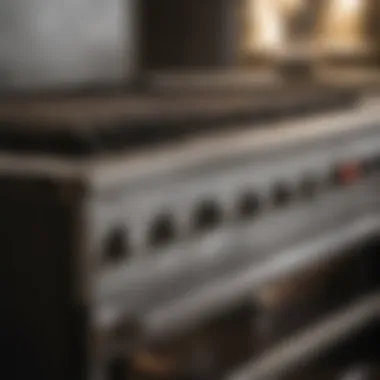

In recent years, the importance of eco-friendly cleaning alternatives cannot be overstated. Homeowners are increasingly seeking ways to reduce their environmental impact. Eco-friendly cleaning products greatly contribute to this objective. They are less harmful to the environment, safer for individuals, and often more cost-effective than their chemical counterparts.
Choosing natural cleaning agents helps minimize chemical exposure. This is particularly beneficial for those with sensitivities or allergies. Furthermore, these alternatives are better for aquatic life. When washed away, harsh chemicals can harm ecosystems. Using eco-friendly solutions promotes a healthier home and planet.
Natural Cleaning Agents
Baking Soda
Baking soda is a versatile and effective cleaning agent. Its key characteristic is its mild abrasive nature. This allows it to scrub surfaces without causing damage. For cleaning stove grills, it works well in loosening grease and dirt. You can create a paste by mixing it with water. This paste can be applied directly to stubborn stains.
One unique feature of baking soda is its ability to neutralize odors. This is useful for keeping your grill smelling fresh. There are minimal disadvantages to using baking soda, as it is non-toxic and safe. However, it might require some scrubbing for tough stains.
Vinegar
Vinegar is another excellent natural cleaning agent. It is well-known for its acidity, which helps dissolve mineral deposits and grime. For stove grills, a mixture of vinegar and water can work wonders in cleaning various surfaces. The key characteristic of vinegar is its ability to cut through grease effectively.
The unique feature of vinegar is its antimicrobial properties. Not only does it clean, but it also helps in killing certain germs. However, its strong smell can be a disadvantage, though it dissipates quickly. Overall, vinegar is a popular choice for eco-friendly cleaning.
Lemon Juice
Lemon juice offers a natural and pleasant cleaning option. Its most notable aspect is its inherent acidity, giving it strong cleaning properties. Lemon juice is effective in breaking down grease and removing stains. Its fresh scent also adds an appealing quality to the cleaning experience.
One unique feature of lemon juice is its antibacterial properties. This can help in ensuring a more sanitized stove grill. The downside is that lemon juice may not be as strong as some other cleaners for heavy-duty jobs. However, its natural ingredient profile makes it a favorable choice for many homeowners.
Homemade Cleaning Solutions
Creating homemade cleaning solutions is an excellent way to combine the benefits of natural ingredients. These solutions can often be customized to fit specific cleaning needs. For instance, mixing baking soda, vinegar, and water creates a powerful cleaner that is effective and safe.
To prepare a basic homemade cleaner, consider the following simple steps:
- Gather ingredients: You will need equal parts of water and vinegar, and a few tablespoons of baking soda.
- Mix together: Combine all ingredients in a spray bottle for convenience.
- Apply: Spray the mixture on the dirty surfaces of your stove grill and let it sit for a while before scrubbing.
- Rinse: After cleaning, rinse the surfaces with warm water.
This method not only provides an efficient cleaning solution but also ensures that harmful chemicals are kept at bay. Through such practices, homeowners make informed choices that contribute to environmental health while maintaining their appliances effectively.
When to Seek Professional Help
Cleaning a stove grill can be a routine task for many homeowners. However, there are instances when seeking professional help is the more prudent choice. Understanding when to call in the experts can save time, prevent damage, and ensure optimal results.
Professional cleaning services often possess specialized tools and expertise that enable them to tackle extensive grime and buildup. They can efficiently access hard-to-reach areas that may not be dismantled easily by an average user. Moreover, these professionals are well-acquainted with various types of grills and their maintenance requirements, ensuring that the cleaning process is handled appropriately without risking any damage.
Many people may overlook the signs that indicate their grill requires professional intervention. It is wise to familiarize oneself with these indicators to make informed decisions. Additionally, understanding how to select a reliable cleaning service is just as crucial to ensure peace of mind and satisfactory results throughout the process.
Signs That Indicate Professional Cleaning is Needed
There are clear signs that suggest the need for professional cleaning. Firstly, if you notice heavy grease accumulation and persistent stains that regular cleaning methods fail to remove, it's a signal for professional assistance. Another indicator is when there are odors that don��’t dissipate despite efforts to clean. This can suggest deeper issues that need address.
Furthermore, if your grill shows signs of wear and tear, such as corrosion or uneven heating, it’s best to consult a professional. Ignoring these issues can lead to malfunctions or unsafe usage. Lastly, if cleaning becomes overwhelmingly daunting or time-consuming, it might be worth hiring professionals to save your energy and time for other responsibilities.
Choosing a Reliable Cleaning Service
Selecting a reliable cleaning service can be tough, yet there are several considerations to keep in mind. Start by checking the qualifications and experience of the service providers. Look for companies that specialize in grill or kitchen cleaning, as they will have specific training.
It can also be useful to read customer reviews or ask for recommendations from friends or online communities. Platforms like reddit.com or facebook.com often provide feedback on local services.
Additionally, always inquire about the cleaning methods and products they use. Ensure that these align with your preferences, particularly if you are sensitive to chemicals or prefer eco-friendly options.
Finally, verify that the company is insured. This protects both you and them in case of accidents or damages during the cleaning service. Taking these factors into account will help ensure you select a professional cleaning service that meets your needs.
Culmination
Cleaning your stove grill is not just a chore, but an essential ritual that ensures both safety and functionality in your kitchen. The importance of maintaining a clean grill lies in several key elements which extend beyond mere aesthetics. It influences health implications, impacts flavor, and contributes to the longevity of the appliance itself.
A clean stove grill is crucial for health. Food particles and grease can harbour bacteria. Regular cleaning prevents cross-contamination, especially when preparing different food items. This is especially relevant for families where food safety is a priority. Ignoring grime can lead to health risks, reminding us to prioritize cleanliness in our cooking environment.
Moreover, a clean grill can significantly enhance the flavor of food. Residues from previous cooking can alter the taste of subsequent dishes. When old flavors mingle with fresh ingredients, the result is often subpar. By ensuring a clean cooking surface, one can maintain the intended flavors of food, thereby enhancing the overall dining experience.
Lastly, the longevity of the grill is a significant consideration. Regular maintenance and cleaning can help avoid costly repairs. Grime buildup can lead to wear and tear on the grill, affecting its performance and efficiency. Ignoring this aspect can shorten the appliance’s lifespan, leading to early replacement and wasted resources.
In summary, the act of cleaning your stove grill encompasses much more than the physical activity of scrubbing surfaces. It is a practice rooted in health, culinary quality, and economic sense. As we embrace these aspects, the significance of a well-maintained grill becomes clear, encouraging us to integrate cleaning as a fundamental part of our cooking routine.



